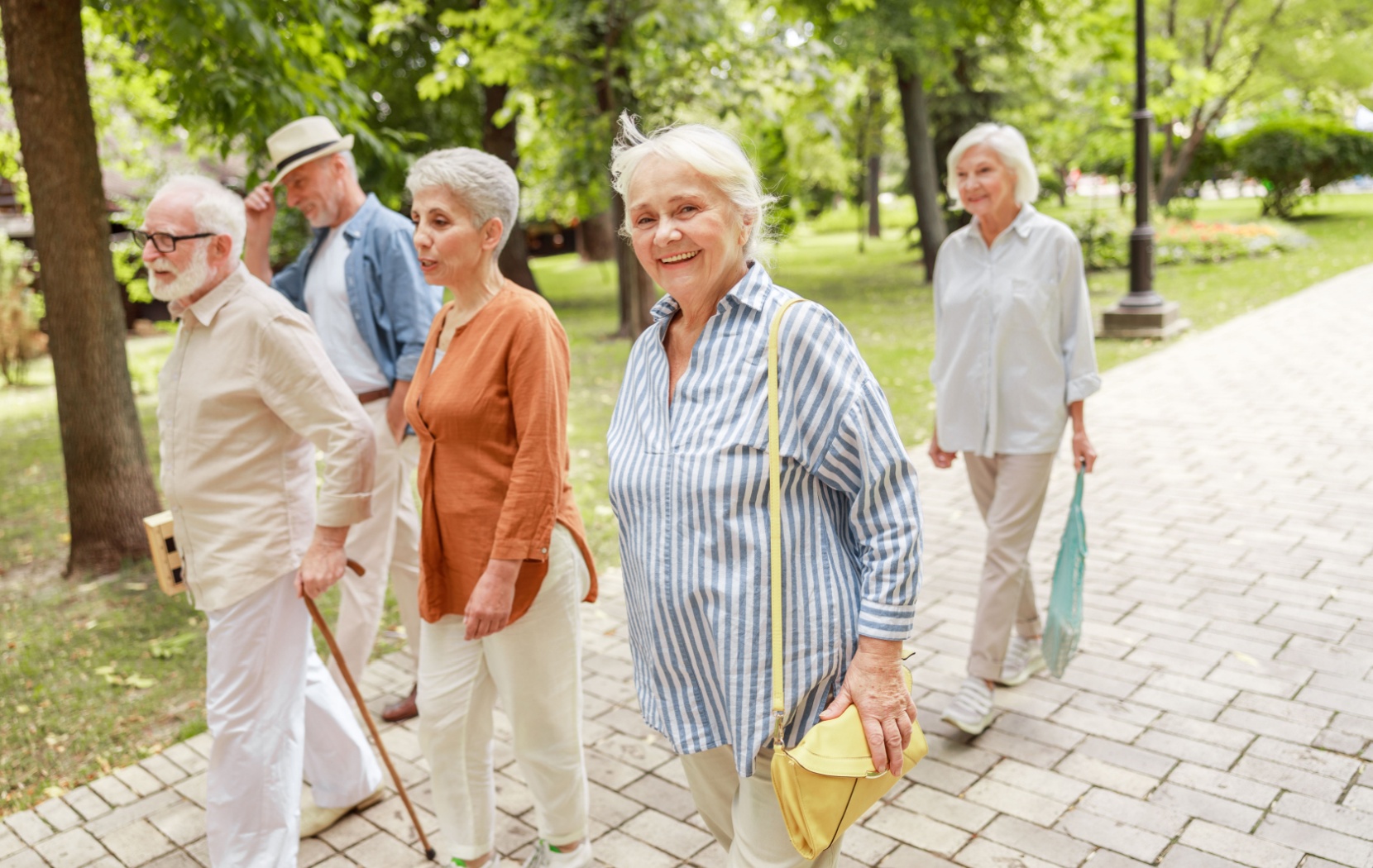Taking a stroll may feel simple, but for seniors, walking can be one of the most impactful ways to stay healthy, active, and connected, even for those with limited mobility. Whether it’s a brisk walk through the park or a peaceful wander around the community, walking offers benefits that are hard to beat.
Walking benefits seniors by maintaining mobility, improving physical and mental health, and allowing opportunities to build community.
The Importance of Staying Active as You Age
An active lifestyle becomes increasingly important as we age. Regular movement helps preserve mobility, strengthens muscles, and keeps the body resilient against age-related challenges. Walking is especially ideal because it’s low-impact, accessible, and enjoyable. For many seniors, it’s also a wonderful way to spend time outdoors and get some fresh air.
So How Does Walking Benefit Seniors?
Walking can benefit seniors’ mental, physical, and cognitive health. Walking is particularly beneficial for seniors because it’s low impact, which means that it can be done by many people, even if they struggle with strength and mobility.
Improves Cardiovascular Health
Walking is a gentle yet effective way to get your heart pumping. According to the American Heart Association, walking as little as 30 minutes a day can lower the risk of heart disease, reduce high blood pressure, and improve cholesterol levels.
For seniors, this can mean increased stamina, better circulation, and reduced strain on the heart. Plus, walking outdoors can give seniors a dose of fresh air and sunshine for added mental and physical well-being.
Strengthens Muscles and Bones
Age-related muscle loss (sarcopenia) and bone-density reduction (osteoporosis) can make everyday activities more challenging over time. Walking helps combat both. It strengthens legs, hips, and core muscles that support balance and stability while also promoting bone health by stimulating bone-strengthening processes.
Bonus tip—walking on varied terrain helps activate additional muscles, further improving strength and agility.
Boosts Mental Health and Cognitive Function
Physical activity isn’t just good for the body—it’s also great for the mind. Walking has been shown to reduce stress, anxiety, and symptoms of depression by encouraging the release of endorphins, the body’s “feel-good” hormones.
On top of physical activity, walking helps encourage seniors to spend more time outside. Time spent outdoors can reduce stress, increase mindfulness, and reconnect people with nature. All of these factors have been shown to have positive benefits for mental health.
Even more importantly for seniors, studies suggest regular walking may enhance memory, concentration, and overall brain health. Walking has been associated with a reduced risk of cognitive decline and dementia, making it an essential habit for maintaining mental sharpness.
Supports Healthy Weight Management
Keeping a healthy weight becomes more difficult with age due to slower metabolism and decreased activity levels. Walking burns calories and helps regulate metabolism without being overly strenuous or intimidating.
Paired with a balanced diet, regular walks offer a sustainable way to maintain a healthy weight while also improving the energy levels needed to enjoy daily activities fully.
Reduces Risk of Chronic Conditions
Chronic conditions like diabetes, arthritis, and hypertension become more common as we grow older. Walking helps manage and even prevent many of these conditions.
For instance:
- Walking can improve glucose control in individuals with diabetes.
- It eases joint stiffness and supports flexibility, alleviating arthritis symptoms.
- Regular movement aids in balancing blood pressure, contributing to better long-term heart and kidney health.
By combining these benefits, walking acts as a powerful preventative measure for lifelong health.
Enhances Social Connection and Community
 Walking doesn’t have to be a solo activity—it’s a great way to connect with friends, family, or neighbors. Whether joining a walking group, heading out with a grandchild, or exploring new walking trails, walking often brings people together, enriching relationships and creating shared memories.
Walking doesn’t have to be a solo activity—it’s a great way to connect with friends, family, or neighbors. Whether joining a walking group, heading out with a grandchild, or exploring new walking trails, walking often brings people together, enriching relationships and creating shared memories.
For seniors, this social connection can also combat loneliness and promote a sense of belonging and purpose. In fact, socialization has significant impacts on our mental and cognitive health as we age.
Maintains Independence and Mobility
One of the greatest joys of aging gracefully is maintaining independence in daily life. Walking helps preserve mobility, balance, and endurance, enabling seniors to stay active and self-reliant for longer.
From running errands to exploring new places, regular walking can keep you on your feet and living life on your terms. It’s about celebrating what your body can do and empowering you to make the most of every opportunity.
Finding Movement that Feels Good For You
At the end of the day, the best kinds of exercise are ones that are fun and easy for seniors to do. If walking isn’t fun and engaging, seniors can also try activities like swimming, exercise classes, or even gardening.
At La Vida Llena Life Plan Community, we offer a variety of activities for all of our residents, so that everyone has a fun way to stay active and social. To learn more about our community and programs you can contact us today.


